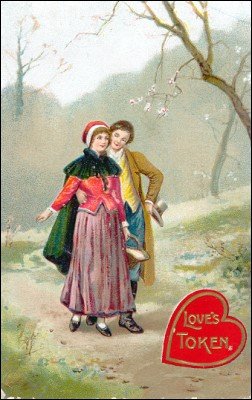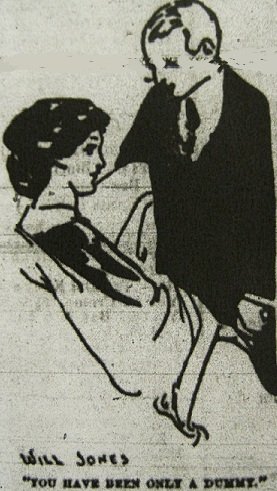DORINDA
How She Kept a Contract Made For Her by Her Father
By F.A. Mitchel
Copyright 1910 by American Press Association
[Welland Tribune, 16 February 1911]
 Dorinda Childs and I were born the same day. My father and my uncle, Dorinda’s father, made an agreement that we two children should marry on our twenty-first birthday-that is-if such a result could be brought about. When we came of age my father had been dead ten years. A few months before I came to my majority I received a letter from my uncle informing me of the agreement made twenty one years before. We lived a thousand miles apart, and I had never seen either him or his daughter.
Dorinda Childs and I were born the same day. My father and my uncle, Dorinda’s father, made an agreement that we two children should marry on our twenty-first birthday-that is-if such a result could be brought about. When we came of age my father had been dead ten years. A few months before I came to my majority I received a letter from my uncle informing me of the agreement made twenty one years before. We lived a thousand miles apart, and I had never seen either him or his daughter.
I am of rather a romantic disposition, and the idea of this marriage was fascinating to me. I wrote my uncle that I would be pleased to make the acquaintance of the young lady to whom I had been pledged and would as soon as convenient go to pay them a visit. Meanwhile I would like a photograph of Dorinda. My uncle replied that he had told her to send me the likeness, and it arrived soon after his letter, inclosed with a very few words which did not refer to the contract, but the writer asked for my photograph which I sent her.
I was delighted with Dorinda’s picture. She looked out of a pair of tender eyes at me, either blue or gray, while in the expression there was indication of character. I found myself looking at the picture a dozen times during the day I received it, went to sleep with under my pillow and dreamed of the original all night. I spent several days framing a letter of thanks.
I received a reply that delighted me. It, too, was noncommittal, but contained very excited sentiments. It seemed to me that the girl who could write such a letter must be one of the most straightforward creatures in the world. I was tinctured with a very young man’s cynical notions about women, especially considering them deceitful. This girl, judging from her photograph and her letter, was evidently the very impersonation of truth. I could not conceive of her stooping to the slightest deception.
Other letters followed, and we soon fell to discussing on paper the matter of paramount interest to both of us. My cousin wrote that she thought we should carry out the contract which has been made for us by our fathers unless we proved to be positively repulsive to each other. To this I demurred emphatically. We were not bound by any contract in which we had not had a part. To this she replied that her dear father had set his heart on seeing before his death the completion of an agreement made with the brother he loved so well. Therefore she confessed that even without a romantic affection for me she would be disposed to yield to his wishes.
One morning on reading my paper I saw that a trust company that had had the care of what property I was to inherit on coming of age had failed. I soon learned that my fortune, some $50,000 had been lost with the wreck. I at once wrote Dorinda to inform her of the change in my affairs and told her that any matrimonial intentions I might have must be put off indefinitely. I also wrote to my uncle to the same effect.
I received no reply from him. Dorinda writing for him to say that he preferred not to influence us in the matter and left us free to act for ourselves. For her part my misfortune had drawn me nearer to her. She had nothing in her own right and would inherit but a small sum from her father, but if I wished a helpmate she would be willing to bear such a lot as I should carve out for myself, she believed, judging from my letters that I possessed honesty and integrity. If I also possessed energy there would be nothing to fear.
Smarting as I was under my loss, this was just what I wished to hear from a girl with whom I was contemplating marriage. But so long as her action was influenced by her father’s wish that she should fulfill a contract made for her by him, I took no real satisfaction in those manifestations of a noble nature. The sensible thing for me to do, had I not sent out my photograph, thus making me known to my cousin, would be to go to her and win her, leaving her to find out my identity after she had given me her heart. I have admitted that I have a lot of romance in me; and such a plan appealed to me; but since the sending of my likeness rendered it impossible, the next best thing to do would be to go and spend some time with her. We might thus confer together and come to a conclusion more advantageously than by standing off with nothing but cold letters between us.
So I wrote Dorinda that if it would be convenient I would make her and her father a visit. In reply I was surprised to receive a letter from my uncle who cordially invited me to come and make as long a stay as I could. He added that Dorinda would write, but was somewhat under the weather. It occurred to me that my cousin’s maidenly modesty had at the prospect of our meeting got the better of her and that this was the real reason for her silence.
My uncle lived in the country, and I was obliged to drive several miles to his house. On turning an angle of the road I saw coming a young man and a young girl. They were hurrying and when they reached me the young man asked:
“Did you come in on an up train?”
“Yes,” I replied, drawing rein.
He turned to the girl with a disappointed look. “There’s not another train for two hours. What shall we do?
She drew him away from me for a whispered conference, casting singular glances at me as if I had something to do with their affairs. The young man came to me and said:
“All the world loves a lover.”
“Y-e-s,” I assented, thinking he referred to me.
“We are a runaway couple. We have missed our train. There is a down train in seven minutes (looking at his watch). If you will lend me your rig we can make it. If not our game is spoiled.”
“Get right in here and I’ll drive you to the station.”
They climbed up, and we all crowded together on one seat. I galloped the horse to the station, but we had plenty of time, since the train was late. The girl went into the station and on the back of a letter her lover gave her wrote a few lines, putting an address on also. Folding it, she handed it to me.
“Will you deliver that?” she asked.
“I will.”
“Before you go anywhere else?”
“I promise.”
“Give it to the person for whom it is intended yourself.”
The train came rattling up to the platform, the young man loaded me with thanks, the girl looked at me with that singular expression her face wore whenever her eyes were upon me, we all shook hands, and they climbed into the train and were gone. Then I got back into my buggy. Looking at the address on the paper I was intrusted with, I saw the name “Edith Boynton.” I asked the station master where Miss Boynton lived, and he described the place. After a twenty minute drive I reached a handsome house and grounds that fitted the description. I drove in under a porte-cochere. A groom held my horse. I went in and sent up the note with my card.
When Miss Boynton came in I was paralyzed with astonishment. She was the original of the photograph of my cousin. She was both blushing and smiling.
“Dorinda!” I exclaimed.
“No. Dorinda wrote this note,” she said, glancing at the paper I handed her.
“What does it all mean?” I gasped.
“Be seated,” she replied, “and I will tell you, or rather I will confess.”
I sank into a seat, and she, throwing herself on a sofa, made her confession.
“Dorinda and I are bosom friends, For a year past she has been in love with the man with whom you met her. Her father has been trying to persuade her to fulfill the contract made for her and you when you were born. She concealed her love affair from him and called me in to help her out. It was my picture you received, and it was I who corresponded with you.”
I was dumbfounded. I sat staring at the girl till she put her handkerchief to her face for a screen.
“Is it possible,” I said at last, “that all this deception has been practiced by the girl who wrote those letters laden with such noble sentiments?”
“I was helping my friend,” she pleaded.
“But I-Neither of you seems to have considered me.”
There was no reply to this.
“May I ask what my cousin said in that note?”
 “She wrote it to send you to me for an explanation before going to her father. When you proposed to make them a visit I was temporarily absent. If Dorinda had written you in her own hand it would have been a different one from those you had been receiving, so she handed your letter to her father for reply.”
“She wrote it to send you to me for an explanation before going to her father. When you proposed to make them a visit I was temporarily absent. If Dorinda had written you in her own hand it would have been a different one from those you had been receiving, so she handed your letter to her father for reply.”
“Well,” I said, rising,” since I have been left out this lovers’ tale I suppose there’s nothing for me to do except return to my home.”
“Why should you be disappointed at losing Dorinda? You have had nothing to do with her.”
“But you have been only a dummy.”
A red signal appeared in her cheek to tell me that she had not been a dummy. There is much to add to this but it is a story by itself. She had pretended to be poor, while she was rich. That kept us apart for some time, but not forever. I have the letters she wrote me, and they do not seem as noble now as they did then. Nevertheless we are a happy couple.

 Subscribe..
Subscribe..

LOVED the story of Dorinda and her deception!
Hi Katherine
Yes, Dorinda is a wonderful tale of love and deception in earlier times. Thank you for writing.
Add A Comment
You must be logged in to post a comment.